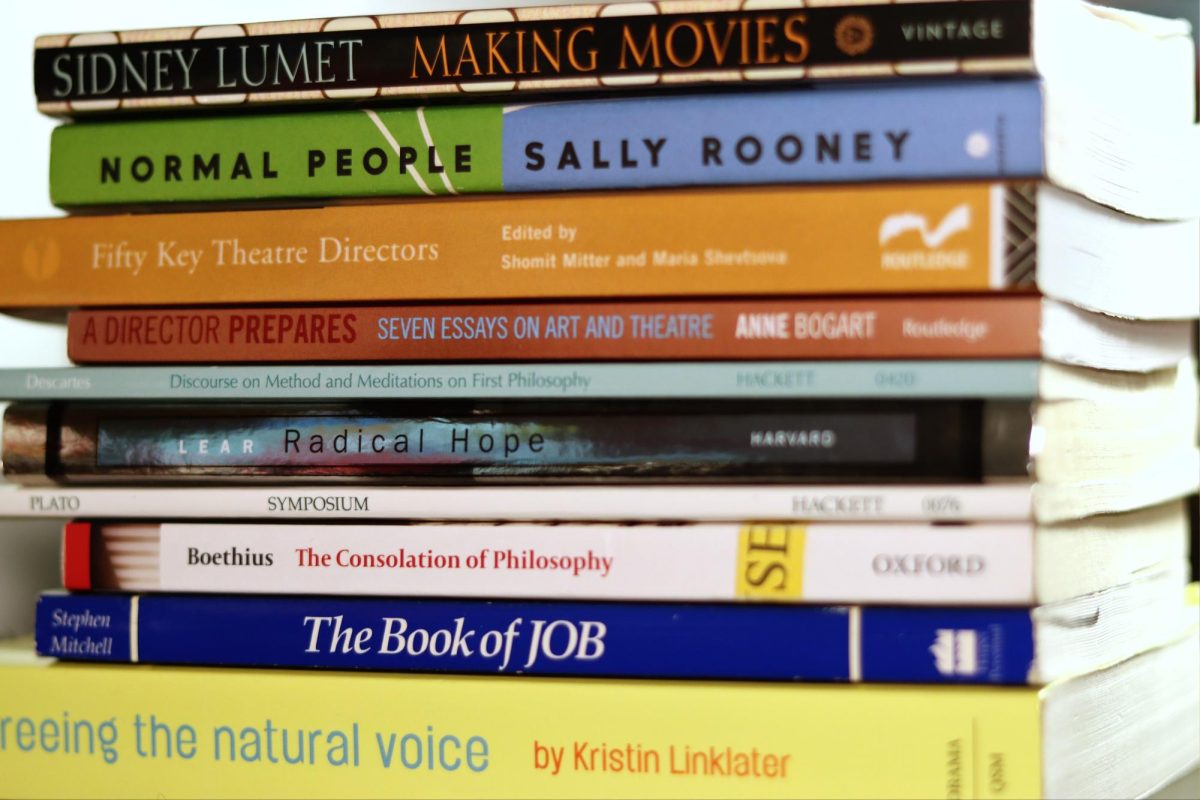College students — at Fordham and most everywhere else — have long lamented the cost of textbooks.
These frustrations often arise when teachers require physical copies of textbooks, which can pose a financial burden. Students turn to multiple strategies to cope with these costs: renting, buying used or relying upon open educational resources (OER) in the public domain or under an open license.
Tyler Herzlich, Fordham College at Lincoln Center (FCLC) ’26, said that he struggled to find an affordable way to fully participate in his classes. Herzlich said the barriers to accessing course materials contributed to his stress and wasted time and energy that he should have spent studying.
“Anything that will deter you from getting the information that you need can completely throw off your studying,” Herzlich said.
The financial burden may be acute for some STEM students, as many classes require physical copies of textbooks on top of lab fees, dissection kits, lab coats and other related materials. Herzlich said classes for his natural science major cost more than classes for other subjects.
“There have been courses I’ve had in the liberal arts where if you don’t get the textbook, you can still pass the course. In these (science classes), you need the lab manual. It’s expensive, and you can’t really find any alternatives,” Herzlich said.
“Textbooks are marketed in such a way that they give you a very generic course in a box.” Jason Morris, professor of biology
Textbook policies often vary with teacher discretion. Jason Morris, professor of biology, never uses textbooks, and even said that they can cause more harm than good.
“I found students were memorizing instead of thinking and were getting caught up with details when I wanted them to focus on the main idea,” Morris said.
Morris uses original research studies published in scientific journals to adapt to rapid developments of the scientific fields he teaches. Textbooks, he said, cannot keep up in the same way.
“Textbooks are marketed in such a way that they give you a very generic course in a box,” Morris said.
Students have proposed alternatives to renting or buying textbooks. Marisa Burke, FCLC ’28, said Fordham should have free physical textbooks on hand for students to borrow.
“The main benefit is to reduce the financial burden associated with purchasing expensive course materials.” Karen L. Siedlecki, associate professor of psychology
“I shouldn’t have to spend so much money on a book I either won’t use, or will only use for one semester,” Burke said.
Some departments are listening to students’ concerns and taking steps to change the role of textbooks, including some in STEM. The psychology department’s Diversity, Equity and Inclusion Advisory Council aims to break down the expensive barriers posed by textbooks.
“The main benefit is to reduce the financial burden associated with purchasing expensive course materials,” Karen L. Siedlecki, associate professor of psychology, wrote.
The psychology DEI committee encourages professors to use OER when appropriate. The DEI committee has also created a “lending library” for textbooks in the psychology department. Siedlecki said these approaches create a more robust academic conversation through the promotion of different perspectives.
Some professors such as Flavin recognize the high cost and low availability of print textbooks, but are reluctant to rewrite their syllabi or switch to digital formats.
“One additional benefit is increased flexibility and customization of course material that promotes exposure to multiple different sources,” Siedlecki said.
Jeanne Flavin, associate professor of sociology, said she looks for alternative solutions. She said that the quality of OER is uneven and should not be heavily relied on as the primary course text. Additionally, OER work with digital copies where Flavin said she prefers to use physical books when possible.
“There’s a lot of ways (benefits to physical copies) that I think are even intangible in ways both very specific in terms of reading comprehension and reducing distractibility, and not wanting to give up on the joy of being with a book,” Flavin said.
Some professors such as Flavin recognize the high cost and low availability of print textbooks, but are reluctant to rewrite their syllabi or switch to digital formats.
Some students are only notified of mandated texts on the first day of classes, potentially exacerbating issues related to price and availability. Flavin said that students — particularly first-years — should be able to enjoy their summers without feeling like they are behind before they even arrive on campus. Additionally, with shifting enrollment as students add and drop courses, it can be hard to find an equilibrium of when it is appropriate to notify them of the supplies needed. Faculty schedules may get shifted around as well.
Flavin said Fordham previously offered standardized course packets of supplementary readings for students to access at the printing center. She also said the bookstore had a collection system for second-hand copies of student books and that this policy has been out of widespread use for several years since Blackboard centralizes documents online easier.
Dawn Lerman, special advisor to the provost, was part of an advisory council involved with the bookstore’s most recent redesign. The council met because Fordham’s contract with Barnes & Noble was due for renewal. The university decided to partner with Follett, a similar vendor, instead.
“There was the expectation that, going forward, consistent with the industry trend, we would be physically inventorying fewer books,” Lerman said.
One benefit of the digitized model is that more materials are now available as inventorying has been phased out, according to Lerman.
Lerman said similar changes are taking place across the education sector as the publishing industry moves towards a new model that emphasizes digital commerce.
“The model was more of what we might experience as individuals when we use Amazon — that we place an order and it’s shipped directly to us — rather than going to some intermediary retail location,” Lerman said.
One benefit of the digitized model is that more materials are now available as inventorying has been phased out, according to Lerman.
Some subjects have an advantage over others with accessible texts. Classics, for example, is considered to be an economically accessible academic discipline. J. Andrew Foster, associate professor of classics, contextualized the history of classics being widely accessible to the general public.
“Classics as a discipline was substantially concerned with the acquisition, aggregation, storage and preservation, access, retrieval and subsequent dissemination of Greco-Roman texts, particularly when it was conceived of as a primarily literary enterprise,” Foster said.
Today, the Thesaurus Linguae Graecae, a digitized library, offers almost the entirety of the Greek canon, from Homer to 200 CE, for an annual $140 subscription fee. Websites like Perseus also contain a growing corpus online for free. This means there are little to no textbook costs — not just for students, but for anyone interested in learning.
Many students adamantly said that they believe textbooks costs should be reduced, while views among faculty differ on whether or not digital materials are the solution. The general consensus is clear: Surely, we can do better than this.


